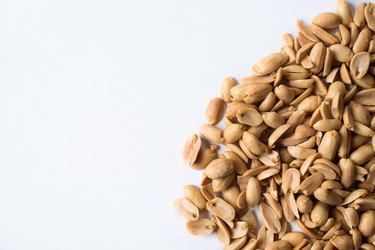
There is no link between popcorn and gastritis, or nuts and gastritis. Neither of these foods is known for producing the symptom of gas, or worsening the conditions related to gastritis.
Some people who experience gas frequently may call it gastritis. Actually, gastritis is a completely separate and, often, more-serious disorder. The causes and treatment for gas are different than those for gastritis.
Video of the Day
Video of the Day
Tip
Nuts won’t worsen gastritis.
Eating to Reduce Gas
Experiencing gas after eating may be due to an array of factors, reports the National Institute of Diabetes and Digestive and Kidney Disorders. One cause is celiac disease or gluten sensitivity, which is a condition that produces intestinal symptoms after ingesting gluten, a protein found in certain grains. Another cause is lactose intolerance, the inability to break down the natural sugar lactose that is often contained in dairy products.
Read More: 10 Foods That Give You the Worst Gas
A third cause could be irritable bowel syndrome. People with this disorder have trouble digesting certain carbohydrates, so they can benefit from following a diet that excludes these foods. This is called called a low-FODMAP diet. Including more fiber in the diet may also be beneficial, notes the National Institute of Diabetes and Digestive and Kidney Disorders.
For other people who experience gas frequently, a doctor may recommend avoiding fried foods, high-fat foods, carbonated beverages and sugar. He or she may also advocate refraining from high-fiber foods for a few weeks and then slowly adding them back into the diet.
The University of Michigan categorizes popcorn and all nuts as foods that produce a normal amount of gas. Since they aren't noted gas over-producers, you don't need to avoid them unless your doctor asks you to do so.
Read More: Which Foods Don't Cause Gas
Overview of Gastritis
Gastritis is a cluster of symptoms caused by the inflammation of the stomach lining, according to the Mayo Clinic. It's often caused by an infection of the bacterium Helicobacter pylori, but sometimes consuming too much alcohol, or the regular use of pain medication, may play a role.
It may occur suddenly, or develop slowly over time. Complications include ulcers and a higher risk of stomach cancer. Most people escape the complications, and quickly improve with treatment.
Where is the pain located with gastritis? It's felt in the upper abdomen. Eating relieves the pain in some people but worsens it in others.
Other symptoms include vomiting, nausea and a feeling of fullness in the upper abdomen after a meal. Gastritis doesn't always present with symptoms.
Ask for an appointment with your doctor if you experience gastritis symptoms for a week or longer. If you have blood in your stools or are vomiting blood, see your doctor immediately, urge doctors from the Mayo Clinic.
Gastritis shares some symptoms with pancreatitis such as abdominal pain, nausea and vomiting. Signs of the latter condition also include fever, oily stools and rapid pulse, as per a list by the Mayo Clinic.
Treatment of Gastritis
For mild cases of gastritis, doctors may ask patients to stop smoking, says Harvard Health. They may also recommend that patients stop drinking alcohol temporarily, and then later limit consumption to two drinks per day.
Dietary guidelines include avoiding spicy, fatty or acidic foods such as orange juice, tomato juice and coffee, notes Harvard Health. According to the National Institute of Diabetes and Digestive and Kidney Diseases, research hasn't found any link that diet or specific food choices leads to the development of gastritis.
Treatment may involve over-the-counter antacids such as Tums, Mylanta or Maalox. Health practitioners may also prescribe H-2 acid blockers like ranitidine or cimetidine. Proton-pump inhibitors and even-stronger acid blockers may be used as well.
If tests show the gastritis is due to a Helicobacter pylori infection, the treatment is antibiotics such as amoxicillin or clarithromycin, states the Mayo Clinic. It's important to take the full prescription, which is usually enough for a week to or two.
- National Institute of Diabetes and Digestive and Kidney Disorders: "Symptoms & Causes of Gas in the Digestive Tract"
- National Institute of Diabetes and Digestive and Kidney Disorders: "Eating, Diet, & Nutrition for Irritable Bowel Syndrome"
- University of Michigan: "Helpful Hints for Controlling Gas (Flatus)"
- Mayo Clinic: "Gastritis: Overview"
- Harvard Health Publishing: "Gastritis"
- National Institute of Diabetes and Digestive and Kidney Diseases: "Gastritis"
- Mayo Clinic: "Gastritis: Diagnosis"
- Mayo Clinic: "Pancreatitis"